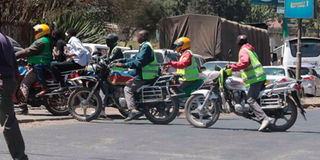Beer, boda boda costs up as tax is adjusted

A number of lobby groups in Eldoret have raised concerns over increasing cases of bodaboda riders being accused of defiling minors.
Consumers could pay more for bottled water, juice, motorcycles, beer and other items after the Kenya Revenue Authority (KRA) increased excise duty on the items to cover for inflation on collected taxes.
KRA raised duty on excisable goods by 4.97 per cent in line with the average annual inflation for the financial year that ended in June.
The taxman, however, excluded duty on fuel after the High Court suspended an increment on petroleum products on September 27, pending the determination of a case filed by two Kenyans – Isaiah Odando and Wilson Yata.
The adjustment was to be from October 1 but was paused by the court injunction.
KRA had targeted about Sh3.7 billion in additional revenue from inflation-adjusted taxation this fiscal year that ends in June 2022.
“The rates of duty on excisable goods have been adjusted using the average inflation rate for the 2020/21 financial year,” KRA Commissioner for Domestic Taxes, Rispah Simiyu, informed importers and manufacturers, adding that the taxes took effect on November 2.
She said the decision is in line with the Excise Duty Act, 2015, which demands that rates be revised in tandem with inflation – the cost of living measure – in the 12 months through June.
Manufacturers are expected to pass the additional costs to consumers, piling strain on a population still yet to recover from the Covid-19 pandemic shocks.
Duty on a litre of bottled water and non-alcoholic beverages, excluding fruit or vegetable juice, has risen by Sh0.29, or 5.05 per cent, to Sh6.03.
The price of fruit and vegetable juice will rise after the KRA raised excise duty by Sh0.58, or five per cent per litre to Sh12.17.
Consumers could pay as much as Sh5.77 more per litre of beer as the new duty has been fixed at Sh121.85.
Tax for spirits has also gone up by Sh13.20 to Sh278.70 per litre, while wine now attracts duty of Sh208.20, a Sh9.86 rise.
Early in the year, East Africa Breweries Ltd (EABL) unsuccessfully lobbied MPs to have excise duty reviewed every two years.
A plea by Coca-Cola to have inflation adjustment done every three years was also rejected.
“The problem with this adjustment is that it puts in law a mandatory excise rise every year. It means beer prices in Kenya, which is the highest in the region, will still shoot up,” EABL chief executive Jane Karuku said on July 30.
“If the trend continues, people will turn to spirits. Unfortunately, this is where there are many counterfeits.”
Tax has risen by Sh576.93 to Sh12,185.16 per unit of motorcycle, but excludes locally assembled bikes and those used as ambulances.
Other items that are expected to attract higher duty are filter cigarettes (Sh0.16 to Sh3.48 per stick), white chocolate (Sh10.43 to Sh220.31 per kilo) and some imported confectionery (Sh1.74 to Sh36.74 per kilogramme).
The announcement has not been received well by the Consumers Federation of Kenya (Cofek).
“Our high taxes are to blame for the smuggling of goods from neighbouring countries,” (Cofek) Secretary General Stephen Mutoro said.
“The increases will widen the gap and boost the profit margins of criminals involved in illicit trade, while stretching the resources of honest and hardworking citizens.”
Specific rates were widely adopted under Kenya’s simplified excise tax regime introduced through the Excise Duty Act in 2015 following the repeal of the Customs & Excise Act, Cap 472.
With the adoption of specific rates of excise duty, the Act also adopted indexation of the specific rates to adjust for the inflationary erosion of collected taxes.
Parliament will, however, have a say on the adjustments. The Finance Act, 2020 demands that the Treasury CS tables the KRA duty adjustment notice in Parliament within seven days from the date of publication for approval.





